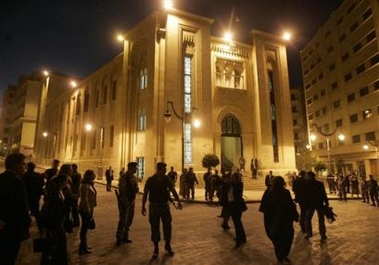 By Lin Noueihed, BEIRUT, March 12 (Reuters) – Lebanese leaders will resume on Monday talks aimed at ending a deep political crisis, but sharp differences remain over the two key issues: disarming Hizbollah and the fate of the Lebanese president. The "national dialogue" conference, the first top-level political gathering since Lebanon’s 1975-1990 civil war, was adjourned abruptly on Tuesday after a row erupted over fiery comments made by an anti-Syrian leader on a visit to Washington.
By Lin Noueihed, BEIRUT, March 12 (Reuters) – Lebanese leaders will resume on Monday talks aimed at ending a deep political crisis, but sharp differences remain over the two key issues: disarming Hizbollah and the fate of the Lebanese president. The "national dialogue" conference, the first top-level political gathering since Lebanon’s 1975-1990 civil war, was adjourned abruptly on Tuesday after a row erupted over fiery comments made by an anti-Syrian leader on a visit to Washington.
Parliament Speaker Nabih Berri, who had called the talks, said they would resume on March 13 instead of continuing until Thursday, but the breathing space does not appear to have brought rival politicians much closer to consensus. "The conference may come up with resolutions on some issues such as Palestinian arms and the status of the Shebaa Farms but there are difficulties reaching agreement over the two key issues," said a Lebanese political source close to the talks.
"The viewpoints are really very far apart and these issues are becoming more complicated."
The fate of President Emile Lahoud is among the thorniest issues; he is under pressure from politicians to resign but has vowed to serve until the end of his term, extended in 2004 under what they say was Syrian pressure. Even more contentious is a U.N. resolution demanding Hizbollah disarm; some Lebanese believe the Shi’ite group should lay down its guns and stick to politics but others see it as legitimate armed resistance to Israel. The talks appeared to be on the verge of collapse after anti-Syrian Druze leader Walid Jumblatt, who had left to meet senior officials in the United States, called from there for Hizbollah to be disarmed. The comments prompted Hizbollah chief Sayyed Hassan Nasrallah to walk out of the talks in protest. But Nasrallah, along with Jumblatt and other top leaders, Christian, Muslim and pro- and anti-Syrian, will return to talks on Monday. BOILING POINT Hizbollah’s resistance attacks were instrumental in ending Israel’s 22-year occupation of southern Lebanon in 2000. Hizbollah says it has the right to keep its arms, partly to liberate the Shebaa Farms, a strip on the border between Lebanon, Israel and Syria’s Israeli-occupied Golan Heights, which it claims is Lebanese soil under Israeli occupation. The United Nations maintains that the Shebaa Farms belongs to Syria and that the Israeli withdrawal is complete. Lebanese leaders are expected to agree on Lebanon’s claim to the Shebaa Farms, which would go some way to legitimating Hizbollah’s arms, but they remain split on whether the tiny strip should be liberated by force or through diplomacy. The leaders are also expected to agree that Palestinian fighters not carry arms outside the country’s 12 refugee camps, which are run by Palestinian factions. U.N. envoy Terje Roed-Larsen said on Saturday he supported the talks, which he hoped would help implement Security Council resolution 1559, demanding that all militia in Lebanon disarm. "Several of the multiple conflicts in the region are reaching a boiling point. The national dialogue between all parties in Lebanon … is one of the few signs of conflict resolution through peaceful means in the Middle East," he said. "The U.N. remains fully committed to the full restoration of Lebanon’s sovereignty and political independence." (Additional reporting by Laila Bassam)


